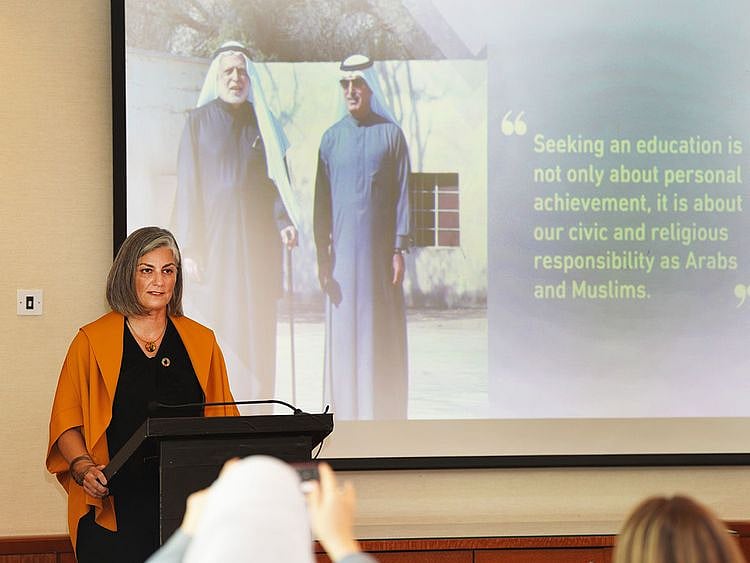How Abdullah Al Ghurair Foundation for Education empowers Emirati, Arab youth
The Foundation has served over 67,000 students including 18,000 from the UAE

Dubai: More than 67,000 students, including 18,000 from the UAE and Arab world last year, were supported by the Abdulla Al Ghurair Foundation for Education since it was set up in 2015, the foundation announced during a media briefing in Dubai on Thursday.
Abdulla Al Ghurair Foundation for Education is one of the largest privately funded philanthropic foundations based in the UAE. It was established by Abdulla Ahmad Al Ghurair, a leading Emirati businessman and philanthropist, to ensure that Emirati and Arab youth have access to the support they need to thrive.
According to its latest report, the foundation has covered 21 countries in the Arab region last year, impacting the lives of 18,000 beneficiaries — 12 per cent of whom were Emiratis. Additionally, 13 new multi-sector partnerships were created for the benefit of students applying to universities. The foundation also saw 188 students who received scholarships from the Foundation graduate.
Also Read
Ten UAE schools among top 100 private schools in the worldRegister now for Gulf News Study in Canada to explore higher education opportunitiesPersonal mission
Abdul Aziz Al Ghurair, chairman of the foundation, said: “It has been my personal mission to build upon the work of my father. Together with our partners, we are ensuring my family’s legacy is one of service. We are supporting relevant, high-impact solutions to the challenges of today, and prepare our youth for the opportunities of tomorrow. We are empowering leaders, upskilling careers, and elevating livelihoods through education.”
“To achieve this, we prioritise transparency, accountability, and measurable impacts in all our work. We practice collaborative strategic philanthropy that is beholden to those we serve; providing services that are first and foremost responsive to our beneficiaries needs,” he added.
Continuing service
Dr Sonia Ben Jaafar, CEO of the Abdulla Al Ghurair Foundation for Education, said: “We are proud of the Foundation’s success to date, expanding our reach, and supporting thousands more students across dozens of countries.
“The Foundation is here to serve the community and last year’s Annual Report showed the deeper, broader, and more lasting positive impact the Foundation is having, helping improve the education and talent ecosystems to increase collaborations and authentic partnerships. It is vital that Emirati and Arab youth receive high-quality education opportunities that lead to elevated livelihoods, and enable them to compete, succeed and achieve their goals as we work towards a sustainable future,” she added.
Dr Ben Jaafar also noted significant steps were made by the Foundation to bring in innovative solutions to address challenges facing Emirati and Arab youth. This included increasing the network of private and public sector partners, offering hands-on private sector experience, and improving access to online learning programs to make them more accessible to Emirati and Arab youth.
New partnerships
New strategic partnerships were also agreed, such as the American University of Beirut launching the Abdulla Al Ghurair Hub for Digital Teaching and Learning last year, to strengthen the education systems that break down barriers to Higher Education.
Moreover, the Foundation expanded its work through the University Consortium for Quality Online Learning (UCQOL), collaborating between the UAE Ministry of Education and nine of the UAE’s top universities, to facilitate the development of high-quality online programs for Emirati and Arab students.
NOMU, a multi-sector youth development initiative under the Foundation is aimed at empowering 25,000 Emirati youth by 2025. Plans are to support 50,000 Emirati and Arab youth to become ready for higher education, entrepreneurship, professional careers, and future-proof work for the sustainable development of the nation, region and globe.
Dr Ben Jaafar said other successful collaborations were made by the Foundation, including working with the prestigious Massachusetts Institute of Technology (MIT) and the United Arab Emirates University (UAEU) to organise the Arab region’s first MIT Innovation Leadership Bootcamp that gathered 120 participants, 76 per cent of whom were Emiratis.
Sign up for the Daily Briefing
Get the latest news and updates straight to your inbox
Network Links
GN StoreDownload our app
© Al Nisr Publishing LLC 2026. All rights reserved.